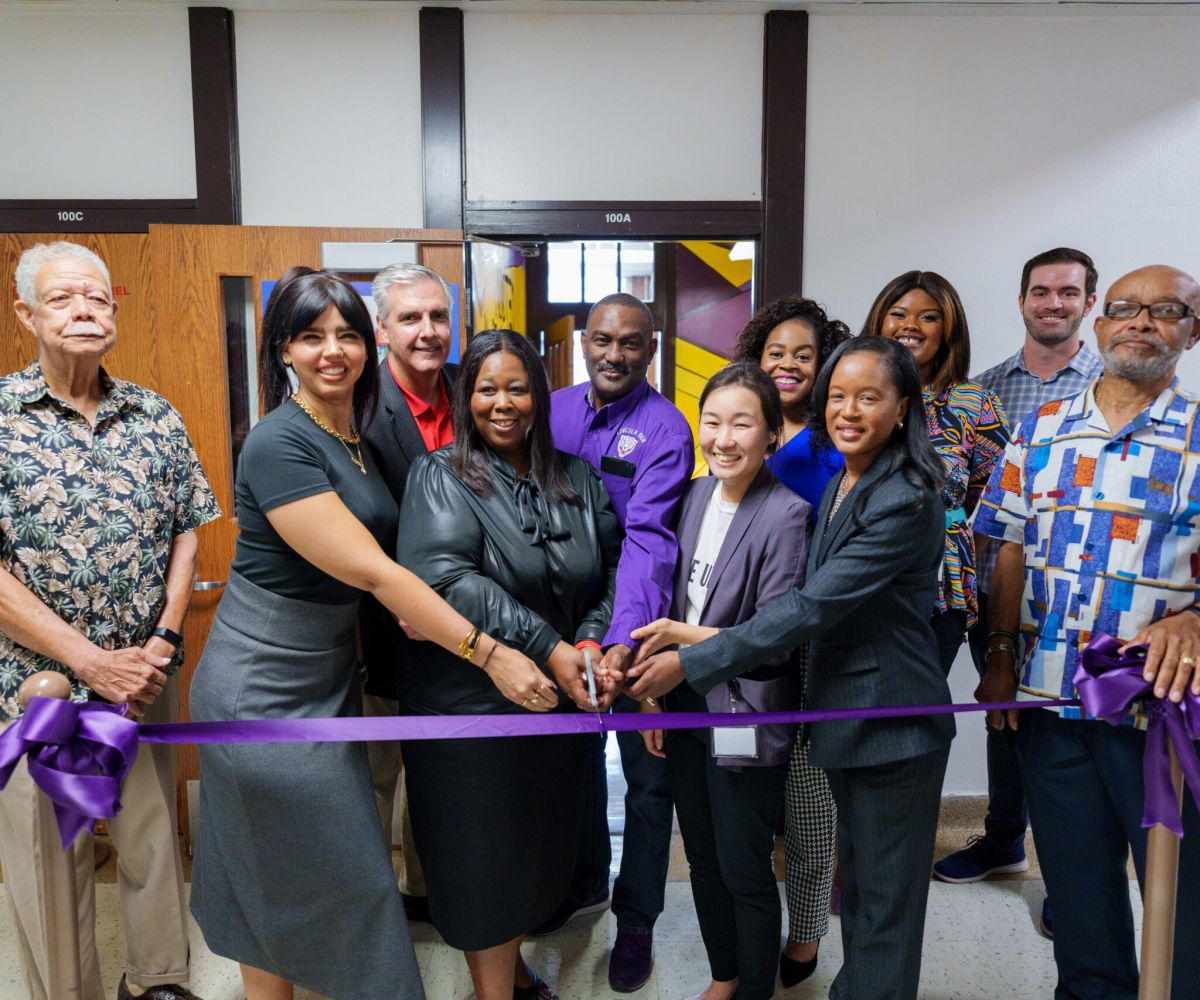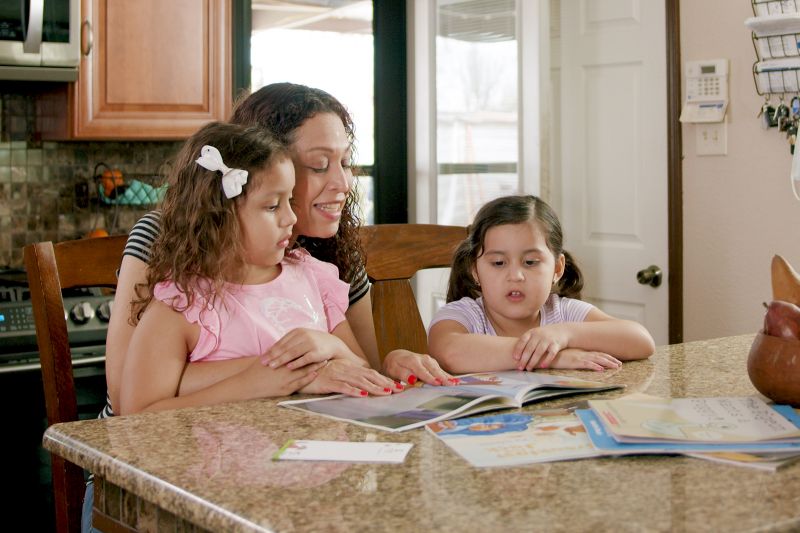School Resource Rooms Benefit the Entire Community

In schools across North Texas, unequal access to key resources can negatively affect children’s educational outcomes, preventing them from succeeding in school and potentially impacting the rest of their lives.
At United Way of Metropolitan Dallas, our work to improve access to education, income and health includes addressing under-resourced schools and communities. We have seen that students who have the resources and support necessary to succeed in school are more likely to secure good-paying jobs, which in turn enables them to afford quality health care for themselves and their families.
To combat the effects of under-resourced schools, we work with local school districts and corporate and community partners to establish campus-based community hubs in areas where a lack of investment has negatively affected schools. These resource rooms not only benefit students at the host campuses; they also serve thousands of students at nearby schools, as well as teachers, parents and other community members.
Read on to learn more about the impact of under-resourced schools on our children, how campus-based community hubs benefit the entire community, and how you can support this important work.
The Effect of Under-resourced Schools
When schools don’t have access to adequate resources, students suffer. These resources often include up-to-date school textbooks, smaller class sizes and one-on-one time with teachers, key instructional materials, and other necessities. In many areas of North Texas—especially those communities with a wealthy tax base—resources like these are a given. In places like Southern Dallas, they are less common.
Unfortunately, this situation plays out in schools across the country. In fact, America’s educational system is one of the most unequal in the developed world, according to The Brookings Institute.
That inequality disproportionately impacts children of color, as the Brookings researchers explain: “Educational outcomes for minority children are much more a function of their unequal access to key educational resources … Despite stark differences in funding, teacher quality, curriculum and class sizes, the prevailing view is that if students do not achieve, it is their own fault. If we are ever to get beyond the problem of the color line, we must confront and address these inequalities.”
In North Texas, we can see the impact of these differences by looking at the breakdown of educational outcomes in two key areas:
- Third-grade reading proficiency. Children of color, on average, are less likely to read on grade level by third grade. While 62% of white third graders read proficiently, that number falls to 35% and 41%, respectively, for Black and Latinx students.
- College readiness. Similarly, Black and Latinx students are much less likely to be college-ready when they graduate high school. While 42% of white high schoolers are prepared for college, only 15% of Black and 17% of Latinx students are.
These two metrics may seem unrelated, but they’re actually closely connected. According to a study from the American Educational Research Foundation, students who are both not reading proficiently by third grade and living in poverty are 13 times less likely to graduate from high school on time compared to their proficient, more affluent peers.
These disparities—which, again, are typically a result of unequal access to resources—can negatively impact an individual throughout their life, affecting how much they can earn in their career, their ability to access quality health care and, in turn, their children’s futures.
Improving Access to Education Resources
A key component of improving access to education, income and health—the building blocks of opportunity—involves addressing the problems impacting education in our region.
Community hub resource rooms are just one of the ways we work with our partners to address gaps in educational access. In the last year, through our Southern Dallas Thrives initiative, we opened two new resource rooms at Lincoln High School and South Oak Cliff High School, delivering key resources to more than 3,500 students, teachers and community members.
The rooms aren’t simply a space for students to gather; they are a hub of resources and services that have the power to open opportunities for everyone in the community. For example, our latest resource room project, at Lincoln High School, includes:
- Multiple computers and printers with seating for group meetings or classes
- A collection of free books through a partnership with the Dallas Public Library
- Free resources including school uniforms, snack kits provided by GoodrCo., toiletries and hygiene products
- Resources for the entire family, such as technology access, technical assistance and academic tutoring (plus, in the future, peer mentoring and financial literacy seminars)
- A private room and office to be used for counseling and meetings with students, parents and teachers
- A teachers’ lounge with a coffee and tea bar, comfortable seating for relaxation, and flexible tables for meetings
All of the services and resources support goals to improve student achievement and close opportunity gaps.
“School hours are already busy times for staff members, so you can imagine how challenging it can be for them to be confronted with a lack of basic needs that have a direct impact on student academics,” explains Cathy Kang, director of education and career success at United Way of Metropolitan Dallas. “By providing books, computers, printers, uniforms, food items, hygiene products and more, this room is intended to provide those wraparound services and resources so our educators can focus on academics. By rallying alongside partners like Dwell with Dignity, CGI and EY, United Way wanted the school to see that they have an entire community in their corner. We hope that this room will be a safe place for students and families to access needed resources and services to realize their full potential.”
For this project, Dwell with Dignity, an alum of our Social Innovation Accelerator, transformed the space with the help of dozens of dedicated volunteers who donated at least 80 hours in all. Meanwhile, CGI and EY provided generous support that made this project possible.
As the room reached completion, Lincoln High School Principal Johnna Weaver recognized how transformative it would be for her students.
“In addition to providing a space for our hardworking teachers to recharge, this room will be a welcoming place for our students and their families to access the critical resources and services that they deserve to reach their full potential,” she said. “We need to address needs beyond the classroom for students to be successful, and we know this resource room will do just that.”
Support Education in North Texas
With the support of volunteers and nonprofit and corporate partners, our targeted resource rooms are capitalizing on the community’s biggest opportunities and addressing the community’s biggest challenges. Together, we’re improving access to education for thousands of Southern Dallas residents every year.
This is measurable, lasting change that you can be a part of. Here are three ways you can get involved right now:
- Give: Make a one-time or recurring donation of any size to invest in our initiatives that improve access to education right here in our community.
- Advocate: The Texas Legislature convenes for its 88th session on Jan. 10, 2023. Join United Way in advocating for key bills that will impact education in North Texas. To get started, sign up for our Advocacy Alerts.
- Volunteer: We frequently host volunteer programs that support local students and educators. Keep an eye on current and upcoming opportunities on our volunteer page.
Tags

Invest in Education
Together, we can improve access to education so that all North Texas students are ready to succeed in college or a career. Click below to make an investment in the future of our community today.


